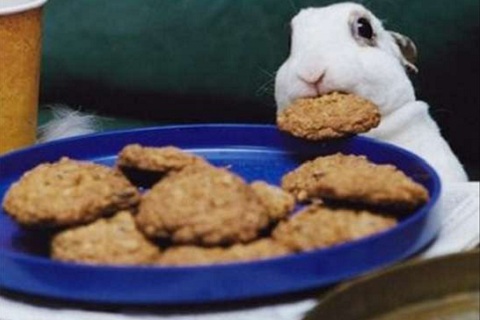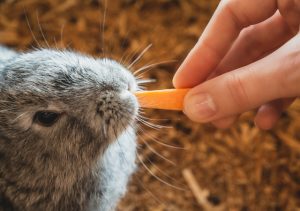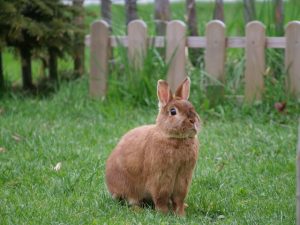
The diet of a domesticated pet rabbit should be similar to what a rabbit in the wild would eat. The best diet for rabbits will consist of plenty of hay and grass and portions of fresh green vegetables and pellets.
Feeding Your Rabbit
The most important part of a rabbit’s diet is hay and grass. Experts recommend that hay and grass make up 80-90% of a rabbits diet and all throughout the day, they should have unlimited access to fresh hay.
Hay is important because it is the main source of fiber, minerals, fiber and vitamins for rabbits. There are two major categories when it comes to hay for rabbits. The first is grass hay, which may be timothy, wheat, oat and ryegrass, and legume hay that includes alfalfa, clover and lucerne. Always select fresh and good quality hay because damp and old hay may become moldy and this is toxic for rabbits.
Rabbits also enjoy grazing on fresh grass and similar to hay, it is a good source of fiber, protein, vitamins and minerals.
Having a variety of fresh vegetables daily will be a good source of nutrients for your pet. Take note to introduce new vegetables in small portions and one at a time. Give your rabbit about a day to digest the new item and if it causes digestive problems, discontinue giving the new vegetable. Select a minimum of 3 types of greens daily that will give different nutrients, varied taste and practice different chewing motions that is good for dental care. A good quantity would be 1 cup of vegetables for each 4 lbs of body weight per day.
Rabbit pellets are important because it provides rich nutrients that will give a number of health benefits to your pet. Make sure to choose a high-quality brand that is high in fiber, check that it’s at least 20% and is matched with a low protein content. As a tip, don’t get the mix because it will give your pet an opportunity to be selective by eating only the pellets they like and getting an unbalanced amount of nutrients.
Giving Fruits and Snacks
Everyone enjoys a treat every now and then that is also the same for rabbits. Ensure that snacks are given only occasionally because if you are abiding by the balanced diet described above, your bunny is already receiving all the nutrition it requires.
Fruit is the best option for a treat, but again it should be given occasionally. The House Rabbit Society recommends 1-2 tablespoons or an amount equivalent to the length of your thumb of fresh fruits be given daily as a treat. Give fruits that are fresh as dried fruits tend to have higher sugar content. Organic fruits are always best because they’ll be cleaner and safer from pesticides and other chemicals.
Do not give your pet treats that are high in carbohydrates like breads, crackers, pasta, cookies or chips. Also, be weary of commercial treats for rabbits as most of these are high in fat and sugar, such as yogurt chips and could lead to digestive problems. Never ever give chocolate as it is toxic to rabbits.
Many rabbits also enjoy carrots, but this is not a fruit, rather a very starchy vegetable and should only be given sparingly. Fruit treats your rabbit might enjoy are apples (without stems or seeds), blueberries, papaya, strawberries, pears, peaches, plums, or melon. Extra-sugary fruits like bananas, grapes, and raisins are good too, but sparingly due to its high sugar content. Too much sugar can lead to upset stomach and an imbalance in the healthy gut bacteria that can lead to serious problems such as obesity or death.
Rabbits should also have constant access to fresh water all day every day. Make sure to change the water frequently so that your bunny only gets clean water. As a tip, since bunnies are playful, have a heavier saucer or tape it down because we can guarantee you will definitely have a number of spills especially when your bunny has just had some sweet treats.
Any food item that will cause diarrhea or constipation must be stopped immediately. Do not give treats to a rabbit that is experiencing soft stool or any other condition. Make sure to give your limited amounts of treats only when your pet is healthy and not experiencing any sickness.





